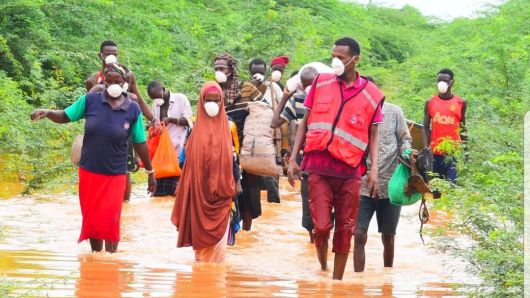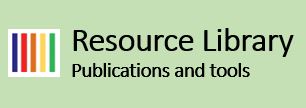13/05/2020 - Opportunity to Reshape Action to Multiple Risks with A Focus on Vulnerable People

Flood response in times of COVID-19. Photo: Kenya Red Cross
The Impact of COVID-19 on poor and vulnerable people is severe. Lockdowns and curfews imposed to curb the spread of COVID-19 have brought untold economic hardships on the poor, some of whom depend on daily wages to buy food. These groups are being pushed into extreme vulnerability. Parallel to COVID-19 are the long-known impacts of climate change and the environmental crisis on the most poor and vulnerable. Science is telling us that the destruction of the environment, exacerbated by climate change, is bringing disasters closer to us.
This crisis moment is an opportunity to rethink our response models, our relationship between people and planet and reshape our approach to risk management with special attention being paid to vulnerable groups, including women, children, the elderly, migrants, jobless, homeless, urban slum dwellers, and indigenous groups.
Partners for Resilience (PfR) works on Integrated Risk Management (IRM) and its track record has demonstrated that risks are interrelated, and demand multi-sectorial action, through working directly with the affected communities, and ensuring that their identified needs and local solutions are fully considered by their partners at local, national, regional and global levels in designing and implementing programmes. PfR’s promotion of resilient livelihoods, including access to basic services like water, health, nutritious food, and social safety nets, is particularly relevant to address COVID-19. Furthermore, risk management must be addressed at large landscapes, just as COVID-19 has shown. PfR is strongly committed to continue to work on this.
As action intensifies on COVID-19 response, PfR is calling on (i). Governments (ii). Private Sector, (iii). Donors and (iv). Humanitarian and Development Partners to act strongly on the following:
To urgently increase investments in Community Resilience, Nature and Climate (in the recovery to COVID-19), thereby addressing root causes of vulnerability.
- Recovery to COVID-19 must focus on increasing investments in strengthening community resilience to multi-hazards including health pandemics. COVID-19 has exposed the grave inequalities of our society, and especially how the most poor and vulnerable remain non-resilient to shocks. Addressing inequality calls for investments in access to basic services (health, shelter, water, food, etc.), as well as investments in strengthened preparedness measures and community resilience (including social protection schemes).
- COVID-19 has thrust the localization agenda into the spotlight once again, with evidence of the critical role of local actors as frontline responders, and yet they are often overlooked and under-funded. Better balance must be found between risk transfer and risk sharing in financing mechanisms. There must be strengthened and targeted support to local CSOs to build their capacities where needed and also resource them, capitalizing on trust built in long-standing relationships, and cultivating new partnerships where possible.
- ‘Build Back Better’- With health pandemics and environmental degradation closely linked, and countries soon starting to implement economic stimulus recovery processes, it is imperative that these recovery actions on COVID-19 involve Nature-Based Solutions, be Green and Climate Resilient to protect both people and the planet for the long-run. The years 2020-2030 mark the Decade of Action towards increased global ambition on climate action, achieving SDGs, as well as the UN Decade on Ecosystem Restoration.
To urgently step-up efforts on Climate Change Action and Response to the Environmental Crisis alongside Response to COVID-19.
- With the world’s focus on COVID-19 response, much of the work on community resilience, and particularly on climate change (and ecosystem protection and restoration) advocacy has slowed down. And yet, current climate-related disasters (massive flooding in East Africa, cyclones in the Pacific) have demonstrated that climate change impacts are not stopping nor slowing down to let COVID-19 pass. Efforts on realizing the commitments in the Paris Agreement must intensify, particularly on adaptation action that ensures systematic use of data across timescales, supporting local actors, ensuring data informs decisions on early action, make preparedness financing available and accessible, and pursuing effective response measures with long-term risk reduction and resilience building measures that focus on the most vulnerable in communities.
- To Urgently Respond to the Environmental Crisis. The years 2020-2030 mark the Decade of Action towards increased global ambition on climate action, achieving SDGs, as well as the UN Decade on Ecosystem Restoration. The Environmental breakdown the world faces, exacerbated by climate change, is a one of the causes in the rise in infectious diseases. Recovery to COVID-19 should invest in nature thereby contributing to the Decade of Restoration, the prevention of future pandemics and reducing other risks.
- Important Role of Private Sector. Businesses world-wide, from small, medium to large enterprises, have been gravely impacted by COVID-19. During recovery from the COVID-19 pandemic, there is a role not only for governments but also for private sector to contribute to a more resilient world. Business continuity depends on resilient ecosystems and societies (people). Therefore, private sector should put people, climate and ecosystems at the core of their business strategy. Economic activities that contribute positively to people and planet yield the best development pathway and economic result in the long run.
To strengthen coherence in Policies & implementation with Strong Links between Local, National and Global Agendas.
- Policy implementation remains largely fragmented even though the narrative on ‘integrated’ approaches has strengthened. COVID-19 has exposed the gap in inter-sectorial planning for response. In linking health and climate action in policies, integrated planning from diverse stakeholders is needed in the development and implementation of National Adaptation Plans (NAPs), Adaptation Communication, Nationally Determined Contributions (NDCs), the 2030 Development Agenda and its 17 goals, the national and local disaster risk reduction strategies and plans.
- Most administrative structures at the global and regional levels, and within Governments (with independent ministries mandated for health, environment, climate change, gender, youth, etc.) and their siloed Budgets/financing mechanisms continue to propel a ‘fragmented’ response. There is an opportunity for building coherence between different institutions at all levels by strengthening legal policy frameworks that guide response.
These key messages are available in French and in Spanish as well





